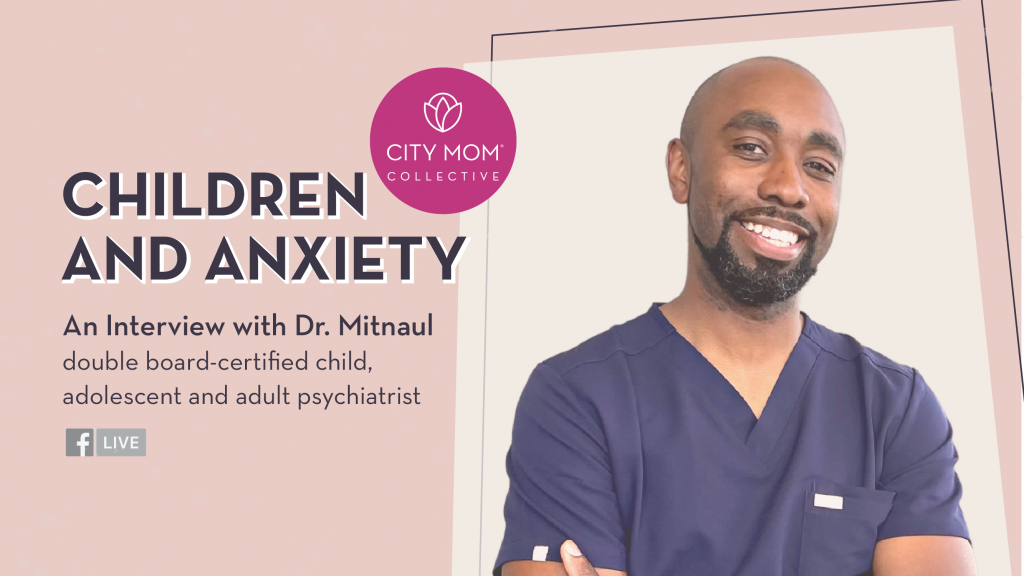
Are you parenting a child with anxiety? Join City Mom Collective CEO, Stephanie Flies, and Dr. Larry Mitnaul, Child Psychiatrist and father of five, as they discuss four frequently asked questions moms have about parenting a child with anxiety.
About Dr. Mitnaul
Dr. Mitnaul is a double board-certified child, adolescent and adult psychiatrist and father of five. He specializes in helping people cope with anxiety and stress, improve relationship satisfaction and communication, and manage work-life pressures. Dr. Mitnaul has expertise in parenting, mental health, and child development. His online school Be Well Academy equips parents with tools to strengthen parent-child relationships, decrease problem behaviors, and build more peaceful homes.
Children & Anxiety | An Interview With Dr. Mitnaul
Tell us about what drives your work and how are you helping families?
I love seeing kids thrive. I think that’s the core of it. I think a lot of us who go into the field feel the same. When I went to medical school, my intention was to do pediatrics. And then somewhere in there, I thought, well, maybe I want to do a surgical subspecialty in pediatrics and do pediatric surgery. And so lo and behold, I save psychiatry for the end. It wasn’t because I didn’t like it, I thought it was going to be interesting, but I thought no, I’m really going to love being in the hospital, where kids are sick, ill or having a hard time and I was put into this really great clinic where I was able to talk to kids. And in talking, things were made better. And I didn’t have to, you know, place a line, I didn’t necessarily have to prescribe, although sometimes that was helpful, too. But just being able to watch their lives be transformed. So watching them overcome anxiety, or doing better at school, or forming stronger relationships with their parents. And so that really, that really capitalized everything that I wanted to do. And it probably helped that during medical school, my kids were being born too. I really started to double down on just this life of the family, how do we make it strong? How do we help support kids? So my wife and I have five kiddos, to some some people will ask, being a physician, does that help you with the parent? I think there’s a lot of humility and strength that I learned actually from being a parent that helps my patients and probably my understanding of where parents are coming from. So yeah, that’s me.
What are some common signs your child might struggle with anxiety?
Good, really great question. And a perfect way to start, we know that anxiety is a normal part in some way or a little bit of worry is a part of what it means to be human and, and part of the child development experience. There are certain types of worry or anxiety that we kind of expect based on age. For instance, the young child who struggles with a little bit of separation anxiety, you know, one or two years old, that’s kind of expected. That is the type of worry that we know that over time and given experience, that kids will get stronger at being able to tackle. I suspect that when people are thinking about worry in their child, they’re thinking about something that goes maybe beyond that, something that’s basically making a child’s world feel a little bit smaller. So for instance, maybe kids are avoiding going to school but maybe that’s not what you’re hearing what you’re actually hearing is, you know, Mom, I have a stomach ache every morning or Mom, I have a headache every morning. Or maybe a child who’s struggling at school, but rather than saying, “I’m struggling at school,” you find all of the papers from that week, kind of crammed into the back and bottom of the of the book bag, barely complete, and you haven’t had an opportunity to help or work with your child on doing it. When it comes to anxiety, often the body is one of the early signs, especially for our younger kids, that they may be struggling. Now, that’s not to say that a tummy ache can’t be a real tummy ache and a headache can’t be a real headache. But if we see these happening at particular times, and they seem to be things that interrupt or get in the way of our child experiencing the world, like going to school and going to daycare, going to a crowded place or something that we know that they enjoy, but for some reason, they’re feeling a little bit selective or inhibited about it. Those are the signs that you know, okay, our kids may be struggling with some significant worry.
Have you noticed an increase in children’s anxiety in relation to the pandemic?
For sure and I know, that’s not just me. I mean, obviously, this is the work that I do, so I expect that people will seek me out for that. But even my pediatric and family physician colleagues, who refer to my clinic or refer to friends of mine, or when we’re just kind of talking offline, we’ll say, yes, we’ve seen a growing number of kiddos who’ve really been struggling with how to how to cope in a world that feels uncertain. Often that’s what anxiety is, you know, it’s a fear of the unknown and that is heightened or higher than it should be, and our kids can kind of struggle in that state. I think one of the signs that I’ve noticed is that for parents they’ve noticed that, the numbers have been climbing a little bit too. And this post pandemic time, has been trying to find a therapist that sometimes, you know, being able to connect our kids is taking a little bit longer than it typically does. So what might have been, you know, a couple of weeks to a month in some areas of the country or, you know, maybe a couple of months or several weeks before they’re able to connect their kids to the support that they’re looking for.
Do you suggest any tools or resources for helping children manage their anxiety?
Absolutely. So one is actually maybe not necessarily a tool or technique. But we do know that in terms of helping our bodies to better self regulate and our children’s bodies to self regulate, is actually making sure that the body is kind of fed with great outdoor activity. And I know, I mean, here in Kansas, it’s been in the 90, so nobody wants to hear that as a part of the solution. But it’s one of those things, it’s low hanging fruit, that, that especially in a technological age, our kids, especially our older ones tend to want to use, the distraction of screens to be that thing that helps to fill the void or helps to fill that space of feeling uncomfortable in the moment or feeling that things are overwhelming. I think one of the beautiful things about helping young bodies reconnect to who they are and their senses is to put those things in action. So that’s one, I just like being outdoors and getting and getting time outside. The other is, for younger kids, parents might be surprised to learn that Sesame Street actually has an app that does a little bit of things like circle square breathing, and mindfulness meditation. There are actual real skills being taught by some of the Sesame Street characters. And I know that they’re not the only ones. So if you type in `mindfulness or breathing and relaxation techniques’, there are probably your child’s favorite characters who are doing and using some of the techniques that we sometimes coach parents into. For more target things, on my website, I have a bit of a library on LarryMitnaul.com. There’s a book series by a psychologist named Dr. Dawn Huebner and she does such a great job at making playful stories that families can read together, and that tackle certain themes of anxiety. So I’ll give you an example. One book that she has is called, What to Do When You Dread Your Bed and that’s for the kiddos who are having difficulty turning off that worry machine going on between their ears, to be able to relax their bodies and get to sleep. We know that great sleep is also one of those things that help buoy our kids and help them to be stronger at tackling worry and anxiety. So, I think in terms of ages and stages, that’s kind of how I would look at some easy and available tools and tips that parents can take with them and practice with their own kids.
As parents, how can we best support our children when they have anxiety?
The first part is trying to understand the worry with them. Sometimes it can be we as parents, can feel pressure, actually, we can feel a little bit of the worry to have the perfect solution. And often the first step is rather than us facing them one on one where we are kind of sitting down beside them observing what it is that they’re worried about, and trying to figure out. Hmm, I wonder what’s going on here. You know, why is school really difficult? I’m not sure that I have the answer, either. Let’s talk to some people who can help us to understand what’s going on. I think once we have a clarified picture of what the worry is, and whether the worry is an exaggerated worry, higher than what actually exists in the real world, versus okay, this is a reasonable worry or concern that we need to address, then we can help by normalizing the parts of that that are just part of the of the natural kind of human experience. As grownups we sometimes take for granted that you know, the world keeps revolving and the sun will shine again. And you know, and so that isn’t always a given. I mean, when you’ve only been on the planet for three or four years, sometimes it can feel uncertain that grandma is going to come back when she leaves from this trip or that the toy is going to be there the next morning if we can’t rescue it from the lawn and so I think helping them to understand, okay, you know, here are the normal parts of the world, here’s how things work. And even if we don’t know the answer, guess what, we have each other to do this together.
How can moms regulate their own anxiety in the chaotic world we live in?
So all of the kid things apply to adults too. So, the being outdoors and getting those endorphins and cortisol kind of working in your favor, getting the really good sleep, too. So hopefully, you’re not dreading your bed if you’re a mom, but sometimes, sometimes you are, and maybe not dreading your bed, but dreading waking up in the morning. And before you can take that first sip of coffee, you are having three hands knocking on the door, asking for the next thing. So taking time for a little bit of self care, and all of those could be included in part of your self care plan. The other part is to recognize when you know you’re not okay, and to be okay at not being okay, that sometimes our, you know, our cup, it really is empty, and we don’t have all the things in our immediate reach to be able to replenish it. And maybe our spouse or even our supportive village might not know the things that can really be helpful. So I never want anyone to shy away from having a good conversation with their primary care physician or therapist. Even if they decide to not embark on 10 to 12 sessions of cognitive behavioral therapy, it can be really helpful to just anchor and reset the world a little bit. And to take a breath and to learn some kind of personalized skills to help you be better, because here’s what’s wonderful, you are worth the investment. The stronger and more full that you feel, the more that you’ll have to offer and to give to your children as well. So I would strongly encourage that if you’re not feeling okay, that’s okay. The good thing is we have really great and effective tools to help people to kind of cope and take that next step.











